|
ARCHAEOLOGY
BOILER ROOM
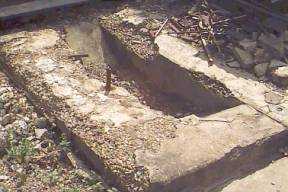
Boiler
room second engine mounting
Unfortunately, the boiler room was sold to the Weald
Supply Company in the 1930's (thought to be C.1936) as
part of the takeover and compensation package.
From the evidence to date it appears to have been
dismantled and re-assembled further to the north-east.
This would also have allowed for the easier removal of
the generating machinery, and is seen as part of the
development on the districts electricity supply network.
The footings remain, as do the concrete
mountings. Other
features include a complex water retrieval system, where
rainwater was captured, filtered over successive height
traps (of slate) and sediment beds and then fed into a
pond or chamber.
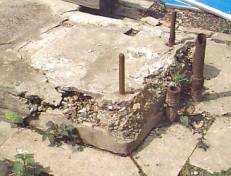
Boiler
or Pump Mount ?
At
this time it is not clear if the
chamber was used to condense steam or to
dissipate heat to cool the generating machinery, or
indeed a mix of the two functions.
However, it is fed water from two rain water filters
built of brick and slate, as seen in the picture below.
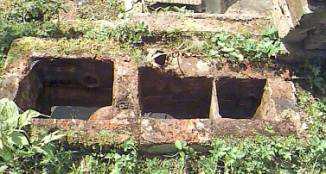
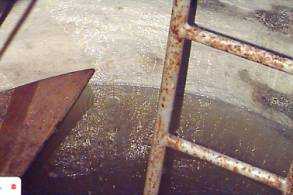
Water
filter feeding rain to chamber
Condensing/cooling
chamber
The
cooling chamber holds about 2,600 gallons, useably. It
is lined
with waterproof render and built of brick as a
subsurface structure. Such chambers were more commonly
used with steam turbines from 1880 to condense steam
vapour to water, or from 1890 as a heat sink to cool
generating machinery.
However, it may have been used in a dual role
with the reciprocating machinery and if that is so, then
it was innovative cutting edge technology at the time.
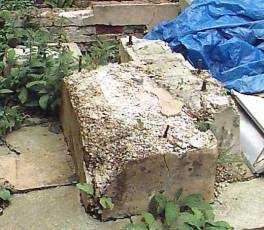
Other
unidentified boiler room mounts
Herstmonceux
Electricity Generating Works Circa. 1900 -
1936
Introduction
| Instructions
| ISBN
| Batteries
| Boiler
Room | Floor
Plan | Ron
Saunders
Industrial
Revolution
| Lime
Park | Machinery
| Map
| Power
House | Argus
1999
Public
Supply
| Roof
Construction | Rural
Supply | Sussex
Express 1913 |
Conclusion
Archaeology
South East
| East
Sussex CC | English
Heritage | SIAS
| Sx
Exp 1999
Memories
of Herstmonceux by Margaret Pollard
|